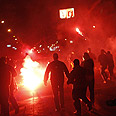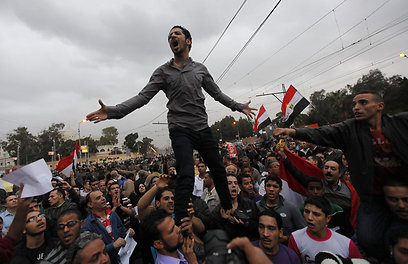
Islamists fought protesters outside the Egyptian president's palace on Wednesday, while inside the building his deputy proposed a way to end a crisis over a draft constitution that has split the most populous Arab nation.
Medical sources said over 120 people were wounded in clashes between Egyptian President Mohamed Morsi's supporters, his opposition and Cairo's security forces; but despite reports of fatalities, the Health Ministry said there had been no deaths.
Related stories:
- Report: Morsi may suspend decree
- Egypt's top court suspends work indefinitely
- Egypt's Morsi grants himself far-reaching powers
Riot police were deployed between the two sides in Cairo to try to stop confrontations that flared after dark despite an attempt by Vice President Mahmoud Mekky to ease the crisis.
Mekky said amendments to disputed articles in the draft constitution could be agreed with the opposition. A written agreement could then be submitted to the next parliament, to be elected after a referendum on the constitution on December 15.
"There must be consensus," he told a news conference, saying opposition demands had to be respected to reach a solution.
Prime Minister Hisham Kandil called for calm to "give the opportunity" for efforts underway to start a national dialogue.
Facing the gravest crisis of his six-month-old tenure, Morsi has shown no sign of buckling to the protests, confident that Islamists can win the referendum and a parliamentary election to follow.
Egypt descends into political turmoil
Earlier Wednesday, a group affiliated with Morsi's opposition set fire to the headquarters of the Muslim Brotherhood's political party in the city of Ismailia.
Egypt's opposition coalition blamed Morsi for the violence and said it was ready for dialogue if the Islamist leader scrapped a decree he issued on November 22 that gave him wide powers and shielded his decisions from judicial review.

Protesters outside presidential palace (Photo: Reuters)
"We hold President Morsi and his government completely responsible for the violence happening in Egypt today," opposition coordinator Mohamed ElBaradei told a news conference.
"We are ready for dialogue if the constitutional decree is cancelled ... and the referendum on this constitution is postponed," he said of the document written by an Islamist-led assembly that the opposition says ignores its concerns.
But liberals, leftists, Christians, ex-Mubarak followers and others opposed to Mursi have yet to generate a mass movement or a grassroots base to challenge the Brotherhood, which has come out on top in two elections since Mubarak's overthrow.
"Today what is happening in the Egyptian street, polarization and division, is something that could and is actually drawing us to violence and could draw us to something worse," said ElBaradei, the former head of the UN nuclear watchdog.
Also on Wednesday, Three of Morsi's aides resigned in protest of his handling of the crisis. With two aides who had quit earlier, now five of his panel of 17 advisers have left their jobs since the problems began.
ElBaradei said Morsi's rule was "no different" from that of former President Hosni Mubarak, whose authoritarian regime was toppled in an uprising nearly two years ago.
"In fact, it is perhaps even worse," the Nobel Peace laureate said.
AP and Reuters contributed to this report
- Receive Ynetnews updates
directly to your desktop















